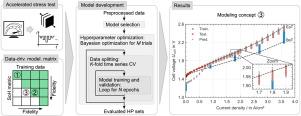Predicting future polarization curves from operating data: Machine learning-based investigation of degradation modeling concepts for PEM water electrolysis
IF 9.6
Q1 COMPUTER SCIENCE, ARTIFICIAL INTELLIGENCE
引用次数: 0
Abstract
Electrolysis is expected to play an essential role in future energy systems that rely on renewable energy sources, especially in achieving climate neutrality in sectors that are challenging to electrify directly. The economic success of this technology is largely dependent on effective predictive maintenance, which requires a clear understanding of the systems’ current and future state-of-health to ensure adequate replacement planning with decreasing efficiency and prevent undesired aging-related failures. Given the incomplete physical understanding and mathematical description of degradation processes, while more and more data is becoming available, data-driven machine learning models are increasingly moving into focus. These models can learn underlying relationships from data without necessitating prior knowledge. Therefore, this study concentrates on predicting the degradation trend of a proton exchange membrane water electrolysis cell using a data-driven machine learning approach. To this end, a comprehensive data-driven modeling matrix is proposed and evaluated through selected practically relevant modeling concepts, which are characterized by different combinations of available training data and desired model outputs. Experimentally, this is facilitated by a targeted accelerated stress test consisting of operating and characterization phases. The applied machine learning pipeline, covering the hierarchical sequence of necessary data preprocessing and modeling steps, is presented in detail to ensure the traceability and reproducibility of the methodology from data collection to model testing and evaluation. As a major finding, it was demonstrated that the degradation trend prediction for the entire polarization curve can be realized using only typical operating data. This represents an initial step toward predicting the complete cell characteristic without interrupting ongoing operation for corresponding measurements.

从运行数据预测未来的极化曲线:基于机器学习的PEM水电解降解建模概念研究
电解有望在依赖可再生能源的未来能源系统中发挥重要作用,特别是在实现直接电气化具有挑战性的行业的气候中和方面。该技术的经济成功在很大程度上取决于有效的预测性维护,这需要对系统当前和未来的健康状态有清晰的了解,以确保在效率下降的情况下进行充分的更换计划,并防止不必要的与老化相关的故障。鉴于对退化过程的物理理解和数学描述不完整,随着越来越多的数据变得可用,数据驱动的机器学习模型越来越成为关注的焦点。这些模型可以在不需要先验知识的情况下从数据中学习潜在的关系。因此,本研究集中于利用数据驱动的机器学习方法预测质子交换膜水电解电池的降解趋势。为此,提出了一个全面的数据驱动建模矩阵,并通过选择实际相关的建模概念进行评估,这些建模概念以可用训练数据和期望模型输出的不同组合为特征。在实验中,由操作和表征阶段组成的有针对性的加速压力测试促进了这一点。详细介绍了应用机器学习管道,涵盖必要的数据预处理和建模步骤的分层顺序,以确保从数据收集到模型测试和评估的方法的可追溯性和可重复性。研究结果表明,仅使用典型工作数据就可以实现对整个极化曲线的退化趋势预测。这是在不中断正在进行的相应测量操作的情况下预测完整细胞特性的第一步。
本文章由计算机程序翻译,如有差异,请以英文原文为准。
求助全文
约1分钟内获得全文
求助全文
来源期刊

Energy and AI
Engineering-Engineering (miscellaneous)
CiteScore
16.50
自引率
0.00%
发文量
64
审稿时长
56 days
 求助内容:
求助内容: 应助结果提醒方式:
应助结果提醒方式:


